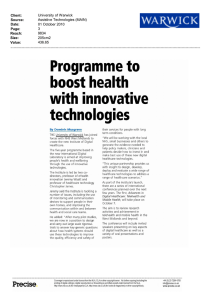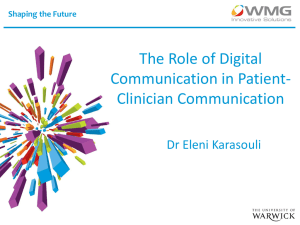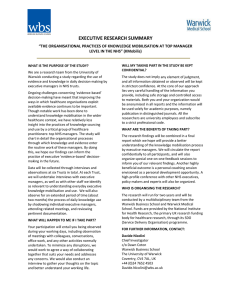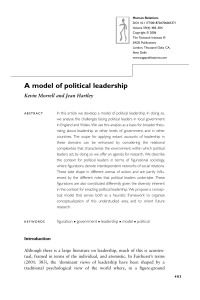LEADERSHIP IN HEALTHCARE A “ROAD MAP” AND LITERATURE REVIEW FROM WARWICK
advertisement
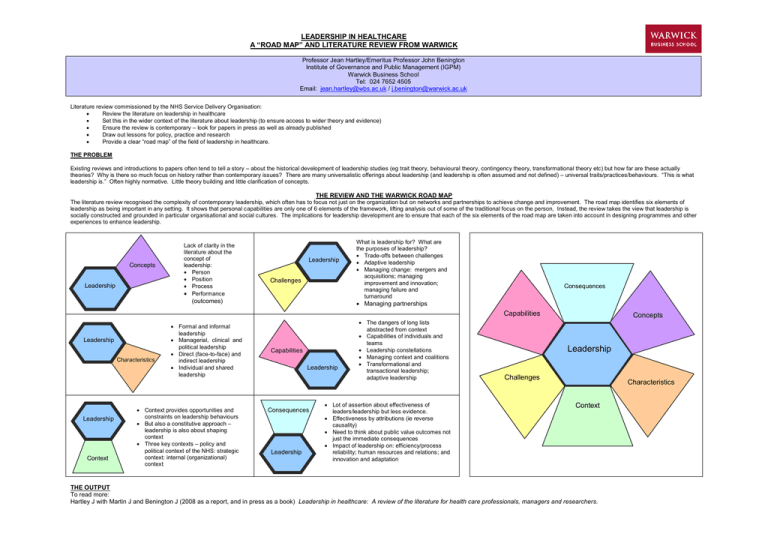
LEADERSHIP IN HEALTHCARE A “ROAD MAP” AND LITERATURE REVIEW FROM WARWICK Professor Jean Hartley/Emeritus Professor John Benington Institute of Governance and Public Management (IGPM) Warwick Business School Tel: 024 7652 4505 Email: jean.hartley@wbs.ac.uk / j.benington@warwick.ac.uk Literature review commissioned by the NHS Service Delivery Organisation: Review the literature on leadership in healthcare Set this in the wider context of the literature about leadership (to ensure access to wider theory and evidence) Ensure the review is contemporary – look for papers in press as well as already published Draw out lessons for policy, practice and research Provide a clear “road map” of the field of leadership in healthcare. THE PROBLEM Existing reviews and introductions to papers often tend to tell a story – about the historical development of leadership studies (eg trait theory, behavioural theory, contingency theory, transformational theory etc) but how far are these actually theories? Why is there so much focus on history rather than contemporary issues? There are many universalistic offerings about leadership (and leadership is often assumed and not defined) – universal traits/practices/behaviours. “This is what leadership is.” Often highly normative. Little theory building and little clarification of concepts. THE REVIEW AND THE WARWICK ROAD MAP The literature review recognised the complexity of contemporary leadership, which often has to focus not just on the organization but on networks and partnerships to achieve change and improvement. The road map identifies six elements of leadership as being important in any setting. It shows that personal capabilities are only one of 6 elements of the framework, lifting analysis out of some of the traditional focus on the person, Instead, the review takes the view that leadership is socially constructed and grounded in particular organisational and social cultures. The implications for leadership development are to ensure that each of the six elements of the road map are taken into account in designing programmes and other experiences to enhance leadership. Concepts Leadership Lack of clarity in the literature about the concept of leadership: Person Position Process Performance Leadership Challenges (outcomes) What is leadership for? What are the purposes of leadership? Trade-offs between challenges Adaptive leadership Managing change: mergers and acquisitions; managing improvement and innovation; managing failure and turnaround Consequences Managing partnerships Capabilities Leadership Characteristics Leadership Context Formal and informal leadership Managerial, clinical and political leadership Direct (face-to-face) and indirect leadership Individual and shared leadership Context provides opportunities and constraints on leadership behaviours But also a constitutive approach – leadership is also about shaping context Three key contexts – policy and political context of the NHS: strategic context: internal (organizational) context Capabilities Leadership Consequences Leadership The dangers of long lists abstracted from context Capabilities of individuals and teams Leadership constellations Managing context and coalitions Transformational and transactional leadership; adaptive leadership Lot of assertion about effectiveness of leaders/leadership but less evidence. Effectiveness by attributions (ie reverse causality) Need to think about public value outcomes not just the immediate consequences Impact of leadership on: efficiency/process reliability; human resources and relations; and innovation and adaptation Concepts Leadership Challenges Characteristics Context THE OUTPUT To read more: Hartley J with Martin J and Benington J (2008 as a report, and in press as a book) Leadership in healthcare: A review of the literature for health care professionals, managers and researchers.
